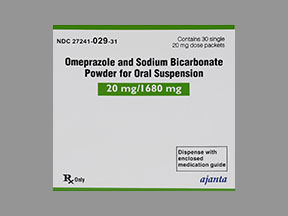
Zegerid Coupons & Savings Card – Discount Prices from $221.64
Brand for: Omeprazole-sodium bicarbonate
My prescription
Edit
20-1680MG, Omeprazole-sodium Bicarbonate (30 Packets)
Select pharmacy

CVS
$221.64
COUPON PRICE
Albertsons
$257.13
COUPON PRICE
Walgreens
$290.10
COUPON PRICE
Walmart
$2511.07
COUPON PRICEZegerid savings card
Show this card to your pharmacist
CVS
$221.64
BIN
ID
PCN
GRP
019876
LH485EDFE4
CHIPPO
LHX
Powered by
Related proton pump inhibitors prescriptions
More prescriptions for heartburn
Related proton pump inhibitors prescriptions
More prescriptions for heartburn
Price history for Zegerid (brand) & Omeprazole-sodium Bicarbonate (generic)
30 Packets, 20-1680MG
Average retail price for Zegerid
Average retail price for Omeprazole-sodium Bicarbonate
Average SaveHealth price for Omeprazole-sodium Bicarbonate
Our price history data is based on aggregated prescription data collected from participating pharmacies in America. Our prescription data updates daily to reflect the latest price changes. If you notice a missing data point, it means there wasn't sufficient data available to generate a monetary value for that date.
Over the last 12 months, the average discount price of Zegerid is $376.51 using the SaveHealth savings card. That's an average savings of 90.33% on Zegerid with our discount card.
*Retail prices are based on pharmacy claims data, and may not be accurate when we don't have enough claims.
Zegerid (Omeprazole-sodium Bicarbonate) dosage forms
Dosage Quantity Price from Per unit 20-1680MG 30 Packets $221.64 $7.39 20-1680MG 14 Packets $113.19 $8.09 20-1680MG 90 Packets $636.33 $7.07 40-1680MG 30 Packets $221.64 $7.39
| Dosage | Quantity | Price from | Per unit |
|---|---|---|---|
| 20-1680MG | 30 Packets | $221.64 | $7.39 |
| 20-1680MG | 14 Packets | $113.19 | $8.09 |
| 20-1680MG | 90 Packets | $636.33 | $7.07 |
| 40-1680MG | 30 Packets | $221.64 | $7.39 |
Is Zegerid the same as omeprazole?
Zegerid contains omeprazole as one of its active ingredients, but it is not the same as omeprazole alone. Zegerid is a combination medication that includes omeprazole and sodium bicarbonate. The sodium bicarbonate acts as an antacid to protect the omeprazole from stomach acid, allowing it to be absorbed more effectively.
Who should not take Zegerid?
Individuals who should not take Zegerid include those who are allergic to omeprazole, sodium bicarbonate, or any other ingredients in the medication. Additionally, people with metabolic alkalosis or low calcium levels should avoid it. It is also important for individuals with severe liver disease, heart failure, or those on a sodium-restricted diet to consult a healthcare provider before using Zegerid. Pregnant or breastfeeding women should seek medical advice prior to use.
Which is better, Nexium or Zegerid?
The choice between Nexium (esomeprazole) and Zegerid (omeprazole with sodium bicarbonate) depends on the individual's specific medical condition and needs. Both medications are proton pump inhibitors used to reduce stomach acid, but they have different formulations. Nexium is often used for treating gastroesophageal reflux disease (GERD) and other acid-related conditions, while Zegerid combines omeprazole with sodium bicarbonate to provide immediate relief and protect the omeprazole from stomach acid. A healthcare provider should be consulted to determine which medication is more appropriate based on the patient's health profile and treatment goals.
What is the generic for Zegerid?
The generic for Zegerid is omeprazole/sodium bicarbonate.
What drugs interact with Zegerid?
Zegerid (omeprazole/sodium bicarbonate) can interact with several medications. Some notable interactions include:1. Clopidogrel: Zegerid may reduce the effectiveness of clopidogrel.2. Warfarin: It can increase the risk of bleeding when taken with warfarin.3. Methotrexate: High doses of methotrexate may have increased levels when taken with Zegerid.4. Diazepam: Zegerid can increase the levels of diazepam in the blood.5. Phenytoin: It may increase the levels of phenytoin.6. Ketoconazole and Itraconazole: Zegerid can reduce the absorption of these antifungal medications.7. Tacrolimus: It may increase the levels of tacrolimus, especially in transplant patients.Patients should consult their healthcare provider for a complete list of potential interactions and to discuss their specific medications.
